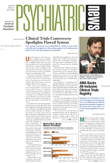Abipartisan group of legislators introduced the Positive Aging Act of 2004 last month in the House and Senate to improve older Americans' access to quality mental health services.
APA, the American Association for Geriatric Psychiatry (AAGP), National Council on Aging, and National Mental Health Association endorsed the legislative proposal to reform the delivery of mental health care to the elderly.
“The current system's failure to diagnose and treat mental illnesses takes a tremendous toll on seniors and their families,” APA stated in a press release.
The most common psychiatric disorders among the elderly are anxiety, depression, and dementia. Americans aged 65 and older have the highest suicide rate in the United States, the bill points out.
A striking statistic is that 20 percent of older Americans committed suicide the same day they saw their primary care physician, Rep. Patrick Kennedy (D-R.I.) said last month at a Capitol Hill briefing. He was joined by Rep. Ileana Ros-Lehtinen (R-Fla.) and Sens. Hillary Rodham Clinton (D-N.Y.), and Susan Collins (R-Maine).
The bill would fund projects that integrate mental health services, especially early screening and appropriate referrals for follow-up care with primary care services in community settings.
“We want to make treatment available where seniors already are—whether that means primary care sites, community health centers, or private practices,” said Clinton.
“The mental health needs of the elderly are often overlooked or not recognized because of the mistaken belief that mental illness is a normal part of the aging process,” said Collins.
Collins and Clinton are on the Senate Health, Education, Labor, and Pensions Committee, which will vote on the bill before it can move on to the full Senate. With only a few days left on the congressional calendar, any action will most likely occur after Congress returns from its August recess.
The legislation also calls for establishing community mental health teams to visit the elderly where they either live or receive social services. The latter includes senior centers, adult day care programs, assisted living facilities, and community health centers.
Kennedy commented, “If you make it more convenient for seniors to have access to mental health services, it has two effects. First, integration with community primary care and social services reduces the stigma the elderly associate with seeking mental health care. Second, the elderly are more likely to access treatment when it's convenient and easy to find.”
The bill would authorize the Substance Abuse and Mental Health Services Administration (SAMHSA) to do the following:
•
Fund demonstration projects that integrate evidence-based mental health services by geriatric specialists into primary care settings.
•
Fund the creation of community-based mental health outreach teams in settings where older adults reside or receive social services.
•
Create a new position of deputy director for older adult mental health services in SAMHSA's Center for Mental Health Services (CMHS).
•
Require that representatives of older Americans, their families, and geriatric mental health specialists be appointed to the CMHS Advisory Council.
•
Include treatment of substance abuse problems in older adults in SAMHSA's“ projects of national significance.”
•
Require state plans under CMHS's block-grant program to include descriptions of the states' outreach to older adults and what services were provided.
The Positive Aging Act also calls for the creation of an Office of Older Adult Mental Health Services in the Administration on Aging (AoA).
The AoA would provide grants to states to develop and test model mental health systems that incorporate evidence-based protocols to detect and treat mental illnesses in the elderly.
The legislation also authorizes the AoA to award grants for demonstration projects providing mental health screening and treatment referrals for the elderly living in rural areas, where few psychiatrists and mental health professionals live.
The AoA would also award grants for projects that demonstrate multidisciplinary collaboration in providing mental health screening and treatment services to older Americans residing in urban areas.
APA applauded the legislation's multidisciplinary approach to treatment,“ which could involve psychiatrists working alongside other providers of medical and social services.”
The legislation would codify a SAMHSA/CMHS program that Congress has funded in the amount of $5 million annually since Fiscal 2002 to provide evidencebased mental health outreach and treatment to the elderly.
“President Bush's proposed Fiscal Year 2005 budget eliminated the entire $5 million in funding for that program for the elderly,” Kennedy complained.
AAGP expressed outrage over the Bush administration's proposal to eliminate funding for this program and over “the lack of attention by the administration to the mental health needs of the fastest-growing segment of the nation's population,” according to a recent AAGP Action Alert.
Sen. John Breaux (D-La.), ranking minority member of the Senate Special Committee on Aging, issued a statement at the press briefing in support of the legislation. The Positive Aging Act builds on his bill of the same name that failed to pass last year. Breaux agreed to have his bill incorporated into the broader legislation introduced last month, according to his press release.
The Positive Aging Act of 2004 can be accessed online at<http://thomas.loc.gov> by searching on the bill title. The legislation had not been assigned a Senate or House number by press time. ▪

